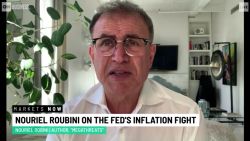China may have just fired the opening shot of a currency war with the United States.
For the first time in more than a decade, Beijing let the yuan weaken past the symbolically important level of 7 to the dollar on Monday.
The Chinese central bank said the move mostly reflected market concern about “trade protectionism and new tariffs on China.” President Donald Trump escalated the trade war last week by announcing that the United States would tax just about every Chinese export starting in September.
But by allowing the yuan to move lower, Beijing is sending an unmistakable signal: It is prepared to deploy its currency as a weapon in the trade war with Washington.
“The fact that they have now stopped defending 7 against the dollar suggests that they have all but abandoned hopes for a trade deal with the US,” said Julian Evans-Pritchard, senior China economist at Capital Economics.
Much now hinges on the US response. Currency wars — in which countries get locked in a cycle of devaluations — hit both consumers and businesses, triggering inflation and sending asset prices plummeting.
“The debate about US [currency] intervention is going to heat up significantly,” said Kit Juckes, a strategist at Societe Generale.
Trump factor
Trump quickly showed he’s paying attention. On Twitter, he called the devaluation “a major violation.”
Despite evidence to the contrary in recent years, Trump has continued to complain that China devalues its currency to make the country more competitive. The question is what he does now.
In recent weeks, Trump has insisted that a currency intervention isn’t off the table. In July, he rebutted a claim by his top economic adviser, Larry Kudlow, that the White House had “ruled out” direct action to weaken the dollar.
“I didn’t say I’m not going to do something,” Trump told reporters.
Taking steps to knock down the US dollar would be a notable break from recent policy and would have far-reaching consequences both at home and abroad.
A weaker currency can boost exports, but it also makes imports more expensive, which can cause inflation and hurt spending. Higher prices could force the central bank to hike interest rates, hitting economic growth.
This pattern could spread globally should other countries decide to retaliate. Devaluation also injects volatility and uncertainty into financial markets, since it causes the value of assets from property to stocks to fall.
“You have balance sheets that start to look very, very bad,” said Miguel Chanco, senior Asia economist at Pantheon Macroeconomics.
To weaken the dollar, the Trump administration could formally announce the end of the strong dollar policy introduced in 1995 under former President Bill Clinton. Trump could also direct the Treasury Department to work with the Federal Reserve Bank of New York to sell dollars in an effort to lower their value.
Chanco doesn’t think the president is there yet, but he does expect tough talk from the White House to continue.
High-stakes move
The decision to let the yuan slide was made in Beijing, a fact that could further complicate trade talks and make a deal even more elusive.
The yuan doesn’t trade freely like other major currencies. Every day, China’s central bank sets a “band” which limits movements in the yuan’s value to 2% up or down.
The last time it was permitted to reach 7 to the dollar was during the 2008 financial crisis.
Currency depreciation could help China mitigate the impact of new US tariffs by keeping its exports affordable in America. But devaluation could cause pain at home. A big drop in the yuan could also spark an outflow of money from China and hurt economic stability.
China saw almost $680 billion in capital leave the country in 2015, according to the Institute of International Finance. That was the last time Beijing caused a market scare by devaluing its currency.
“China has probably determined that striking a deal with the US is unlikely,” said Jason Daw, head of emerging markets strategy at Societe Generale. That gives Beijing incentives to “dig in for a long-term stalemate.”























